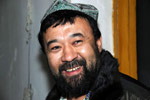Chinese Way
Drum and bass brings quick beats to Beijing
Updated: 2011-02-14 09:49
By Natalie Thomas (China Daily)
From its roots in the UK rave scene and Jamaican dancehall music, drum and bass has grown to become one of the most widely recognized dance music genres worldwide. For the past five years, one man has been on a mission to bring it to China.
Alex Blackie, better known in the Beijing scene as DJ Blackie, still remembers the first time he heard drum and bass at a North London party.
"It was so hardcore, I can't even describe it. It was the moodiest party I've ever been to," he said.
With fast, complex beats, overlaid with often-slow melodies, drum and bass is a more complex and energetic form of dance music when compared to other genres.
"It seemed like the logical thing to do at the time," explained DJ Blackie on his decision to come to Beijing.
"I thought that on hearing my music, people here would be blown away. In reality, they didn't know how to react."
Liu Yadong, a fellow DJ and Tianjin local, recalls a similar reaction when he started trying to get gigs in the capital on his return home from Belgium as a drum and bass convert.
"Chinese people had no idea how to dance to this music; the beat was too fast for them," he said.
From these initial reality shocks, DJ Blackie and Liu have since gone on to become integral parts of the Syndicate, a now legendary drum and bass collaborative that was formed with the aim of raising the profile of the genre in Beijing.
Getting to this stage was not easy.
"We were always the underdogs," said DJ Blackie. "At the start, venues were very reluctant to go out on a limb and give our music a try. Finding places willing to work with us has always been really important."
Despite running regular nights, DJ Blackie admits the fanbase is still predominantly foreign.
"For Westerners, this kind of music is already part of our culture, even though it's considered 'underground'," he said.
He said Chinese music lovers need more time to understand the overall genre.
"People have a lot of misconceptions about what being part of the scene involves," DJ Blackie added.
But progress has been made in the past few years. From humble beginnings playing gigs for beer money, DJ Blackie can now make a living from his music and Liu is busy organizing events in Tianjin.
The main thing the Syndicate is trying to push is getting local Chinese acts on its books.
The crew currently boasts several Chinese DJs, though most of them joined over two years ago, admitted DJ Blackie.
"Since then, we haven't really had anyone new come to our attention, which is something we want to change," he said.
"The one thing I have come to realize is that for a scene to grow, it has to be organic. You can't just transplant something from the UK and expect it to take off."
The success of Acupuncture Records is a testament to this. A home-grown collective of eight DJs and producers, Acupuncture has enjoyed huge success in raising the profile of house and techno music in the city by organizing events and producing records through aggressive marketing.
DJ Blackie remains confident there are Chinese drum and bass DJs out there who are isolated from the rest of the scene.
"What we want to do is connect with these kids who are DJing in bedrooms and give them the support to take it to the next level," he said.
Specials

Spring Festival
The Spring Festival is the most important traditional festival for family reunions.

Top 10
A summary of the major events both inside and outside China.

A role model
Alimjan Halik had been selected as the "Cyberspace Personality Who Moved the Hearts of the Chinese in 2010".